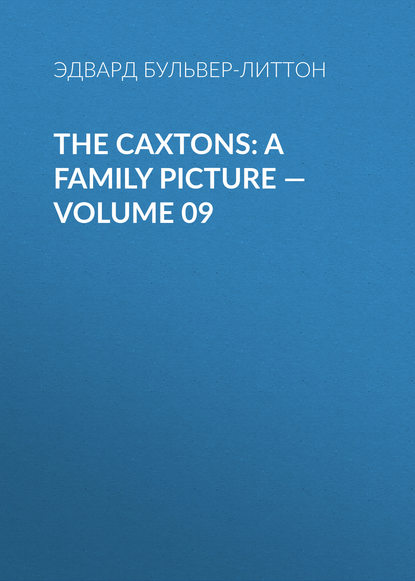По всем вопросам обращайтесь на: info@litportal.ru
(©) 2003-2025.
✖
The Caxtons: A Family Picture — Volume 09
Настройки чтения
Размер шрифта
Высота строк
Поля
"Thank you a thousand times! But what you say confirms a resolution I had taken before you came. I shall make it up with my family and return home."
"Oh, I am so really glad. How wise in you!"
Vivian turned away his head abruptly.
"Your pictures of family life and domestic peace, you see," he said, "seduced me more than you thought. When do you leave town?"
"Why, I believe, early next week."
"So soon," said Vivian, thoughtfully. "Well, perhaps I may ask you yet to introduce me to Mr. Trevanion; for who knows?—my family and I may fall out again. But I will consider. I think I have heard you say that this Trevanion is a very old friend of your father's or uncle's?"
"He, or rather Lady Ellinor, is an old friend of both."
"And therefore would listen to your recommendations of me. But perhaps I may not need them. So you have left—left of your own accord—a situation that seemed more enjoyable, I should think, than rooms in a college. Left, why did you leave?"
And Vivian fixed his bright eyes full and piercingly on mine.
"It was only for a time, for a trial, that I was there," said I, evasively; "out at nurse, as it were, till the Alma Mater opened her arms,—alma indeed she ought to be to my father's son."
Vivian looked unsatisfied with my explanation, but did not question me further. He himself was the first to turn the conversation, and he did this with more affectionate cordiality than was common to him. He inquired into our general plans, into the probabilities of our return to town, and drew from me a description of our rural Tusculum. He was quiet and subdued; and once or twice I thought there was a moisture in those luminous eyes. We parted with more of the unreserve and fondness of youthful friendship—at least on my part, and seemingly on his—than had yet endeared our singular intimacy; for the cement of cordial attachment had been wanting to an intercourse in which one party refused all confidence, and the other mingled distrust and fear with keen interest and compassionate admiration.
That evening, before lights were brought in, my father, turning to me, abruptly asked if I had seen my friend, and what he was about to do.
"He thinks of returning to his family," said I.
Roland, who had seemed dozing, winced uneasily.
"Who returns to his family?" asked the Captain.
"Why, you must know," said my father, "that Sisty has fished up a friend of whom he can give no account that would satisfy a policeman, and whose fortunes he thinks himself under the necessity of protecting. You are very lucky that he has not picked your pockets, Sisty; but I dare say he has. What's his name?"
"Vivian," said I,—"Francis Vivian."
"A good name and a Cornish," said my father. "Some derive it from the Romans,—Vivianus; others from a Celtic word which means—"
"Vivian!" interrupted Roland. "Vivian!—I wonder if it be the son of Colonel Vivian."
"He is certainly a gentleman's son," said I; "but he never told me what his family and connections were."
"Vivian," repeated my uncle,—"poor Colonel Vivian! So the young man is going to his father. I have no doubt it is the same. Ah!—"
"What do you know of Colonel Vivian or his son?" said I. "Pray, tell me; I am so interested in this young man."
"I know nothing of either, except by gossip," said my uncle, moodily. "I did hear that Colonel Vivian, an excellent officer and honorable man, had been in—in—" (Roland's voice faltered) "in great grief about his son, whom, a mere boy, he had prevented from some improper marriage, and who had run away and left him,—it was supposed for America. The story affected me at the time," added my uncle, trying to speak calmly.
We were all silent, for we felt why Roland was so disturbed, and why Colonel Vivian's grief should have touched him home. Similarity in affliction makes us brothers even to the unknown.
"You say he is going home to his family,—I am heartily glad of it!" said the envying old soldier, gallantly.
The lights came in then, and two minutes after, Uncle Roland and I were nestled close to each other, side by side; and I was reading over his shoulder, and his finger was silently resting on that passage that had so struck him: "I have not complained, have I, sir? And I won't complain!"
notes
1
Cicero's joke on a senator who was the son of a tailor: "Thou hast touched the thing sharply" (or with a needle, acu).
2
Rubruquis, sect. xii.
Другие электронные книги автора Эдвард Джордж Бульвер-Литтон
Другие аудиокниги автора Эдвард Джордж Бульвер-Литтон
Последние дни Помпеи




 4.67
4.67












